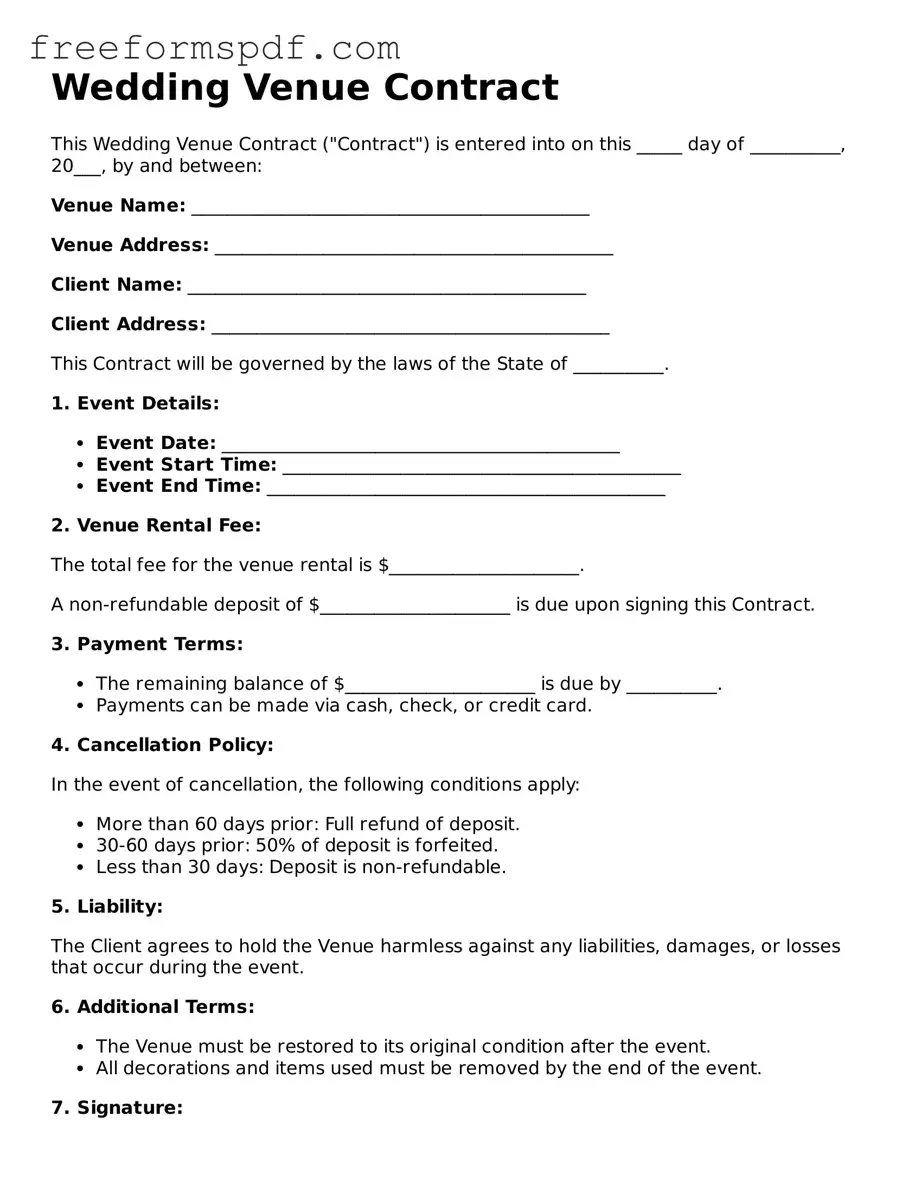Wedding Venue Contract Document
Common mistakes
-
Overlooking the Fine Print: Many couples rush through the contract, focusing only on the main terms. This can lead to missing critical details regarding cancellation policies, liability clauses, and additional fees. Reading every section carefully is essential to avoid surprises later.
-
Failing to Specify Guest Count: A common mistake is not providing an accurate estimate of the number of guests. Venues often have capacity limits, and underestimating this number can result in overcrowding or additional charges. Always confirm the venue's capacity and include a realistic guest count in the contract.
-
Ignoring Payment Terms: Couples sometimes neglect to clarify payment schedules and methods. It's crucial to understand when deposits are due, what forms of payment are accepted, and the timeline for final payments. This knowledge helps in budgeting and prevents potential disputes.
-
Not Discussing Setup and Breakdown Times: Another frequent oversight involves the setup and breakdown times for the event. Couples may assume they have all day to prepare, but venues often have strict timelines. Discussing these details upfront can prevent logistical issues on the wedding day.
Learn More on This Form
-
What is a Wedding Venue Contract?
A Wedding Venue Contract is a formal agreement between a couple and a venue. This document outlines the terms and conditions for renting the space for a wedding. It includes details like the date, time, rental fees, and any specific services provided by the venue.
-
Why do I need a Wedding Venue Contract?
A contract protects both the couple and the venue. It ensures that everyone is on the same page regarding expectations and responsibilities. This can prevent misunderstandings and provide a clear course of action if any issues arise.
-
What should I look for in a Wedding Venue Contract?
When reviewing a contract, pay attention to:
- The total cost and payment schedule
- Cancellation and refund policies
- Included services, such as catering or decoration
- Restrictions on decorations or music
- Liability insurance requirements
-
Can I negotiate the terms of the contract?
Yes, negotiation is common. If something in the contract doesn’t work for you, discuss it with the venue manager. They may be willing to adjust terms to meet your needs.
-
What happens if I need to cancel my wedding?
If you need to cancel, refer to the cancellation policy in your contract. It will outline the process and any potential penalties. Many venues have specific timelines for cancellations that affect refunds.
-
Is it necessary to have a lawyer review the contract?
While it’s not required, having a lawyer review the contract can be beneficial. They can help identify any unclear terms and ensure your interests are protected.
-
What if I have questions after signing the contract?
If you have questions after signing, reach out to the venue directly. They should be able to clarify any points or provide additional information about the services included in your agreement.
Misconceptions
When planning a wedding, understanding the wedding venue contract is crucial. However, several misconceptions can lead to confusion. Here are nine common misunderstandings about wedding venue contracts:
-
All contracts are the same.
Each venue has its own policies and terms. It's essential to read the specific contract for your chosen venue, as they can vary widely.
-
You can make changes later.
Once you sign a contract, it often becomes legally binding. While some venues may allow changes, others may not. Always clarify this before signing.
-
Deposits are non-refundable.
This isn't always true. Some venues may offer a partial refund if you cancel within a certain timeframe. Check the contract for specific terms regarding deposits.
-
All fees are included in the contract.
Additional costs can arise, such as service fees, gratuities, or overtime charges. Make sure to ask about any potential extra fees that might not be included in the initial contract.
-
You can negotiate any term.
While some terms may be negotiable, others are set in stone. Approach negotiations with an understanding of what is flexible and what is not.
-
Cancellation policies are the same everywhere.
Each venue has its own cancellation policy. It’s vital to read this section carefully to understand your options if plans change.
-
Insurance is not necessary.
Some venues require proof of insurance for liability reasons. Check with your venue to see if this is a requirement and plan accordingly.
-
All venues allow outside vendors.
Many venues have a list of preferred vendors or may not allow outside vendors at all. Always confirm what is permitted in your contract.
-
Signing means you can’t change your mind.
While signing a contract is a commitment, you may have a window during which you can cancel or make changes. Review the terms carefully to understand your rights.
Being informed about these misconceptions can help ensure a smoother planning process for your wedding. Always take the time to read and understand your venue contract before signing.
Other Types of Wedding Venue Contract Forms:
Lease Agreement for Renting a Room - Specifies security deposit requirements and conditions.
Additionally, for those seeking a reliable and straightforward method to create their own agreements, the Arizona PDF Forms offers an accessible platform that simplifies the lease preparation process, ensuring that all necessary terms are legally documented and agreed upon by both parties.
Letter to Terminate Tenancy - The letter demonstrates your commitment to fulfilling the lease’s legal requirements before leaving.
